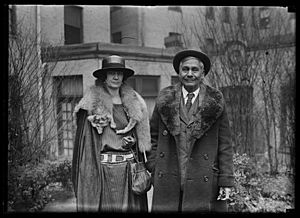Jackson Barnett facts for kids
Quick facts for kids
Jackson Barnett
|
|
|---|---|

Anna and Jackson Barnett at the White House in 1923
|
|
| Born | 1 January 1856 |
| Died | 29 May 1934 (aged 78) |
| Nationality | American |
| Known for | "The world's richest Indian" |
Jackson Barnett (born January 1, 1856 – died May 29, 1934) was a man from Oklahoma who belonged to the Muscogee or Creek people. He became very famous as "the world's richest Indian." This happened because oil was found on his land starting in 1912. The oil wells produced a huge amount of oil, worth up to $24 million.
Jackson Barnett's share of this oil money was about $3 million to $4 million. However, because he could not read or write, and a court decided he was not able to manage his own money due to a head injury, his funds were looked after by the courts and the U.S. Department of the Interior. This arrangement lasted until 1920.
Contents
Jackson Barnett's Early Life
Jackson was the son of Siah Barnett, a farmer who was part Creek, and Thlesothle, a Creek woman. He became an orphan when he was very young. His mother's family then raised him. When he was a young man, he fell off a horse and hurt his head.
In 1903, Jackson received ownership of about 160 acres (65 hectares) of land in Creek County. This was due to a law called the Curtis Act of 1898. However, the government still managed his land for him. During this time, Jackson also supported the Crazy Snake Rebellion, which was a movement by some Creek people.
The Discovery of Oil
In 1912, a lot of oil was found on Jackson Barnett's land. This made him very wealthy. But because of his head injury and because he only spoke the Muscogee Creek language, courts decided he was not able to handle his own money. He was only allowed a small amount of income to live on. He was given a house near Henryetta.
In 1919, the courts allowed some of Jackson's money to be used to build a hospital in Henryetta. It was going to be called the "Jackson Barnett Hospital."
Marriage and Legal Challenges
In 1920, when Jackson was in his seventies, he married Anna Laura Lowe. She was much younger than him. People thought she might have been interested in his money. They had to get married in Kansas because they were not allowed to get a marriage license in Oklahoma.
Jackson's guardians tried to cancel the marriage, but they could not. The plans for the hospital were never finished. Instead, Jackson's money was split between Anna Barnett and Bacone Indian College.
Life in Los Angeles
The Barnetts moved to Los Angeles and bought a large house. Jackson enjoyed spending his time directing traffic at a nearby street corner.
From 1923 to 1929, many legal cases continued about Jackson's money. These cases led to special meetings in Congress. They looked into how the Bureau of Indian Affairs (BIA) managed Jackson's money and other similar trusts. These meetings led to changes in how Native American money was managed. They also led to the Indian Reorganization Act of 1934.
In March 1934, another court ruling said that Jackson and Anna's marriage was not valid. It also said Anna could not have rights to Jackson's money. The court said Jackson had been "kidnapped" by Anna. However, Anna was still allowed to take care of Jackson.
Jackson Barnett's Passing
Jackson Barnett passed away on May 29, 1934, from natural causes. There were rumors that Anna had poisoned him, but these were found to be untrue.
After Jackson's death, Anna was eventually asked to leave the house in Los Angeles. She had gained support from many important people in Los Angeles. She even threw a hatchet during the eviction and had to be stopped with tear gas. Anna spent the rest of her life trying to get back some of Jackson's money, but she was not successful. In 1934, his estate was worth about $3.5 million.
In 1982, the Jackson Barnett No. 11 Oil Well, which was the most successful oil well on his land, was added to the National Register of Historic Places.
 | James Van Der Zee |
 | Alma Thomas |
 | Ellis Wilson |
 | Margaret Taylor-Burroughs |

